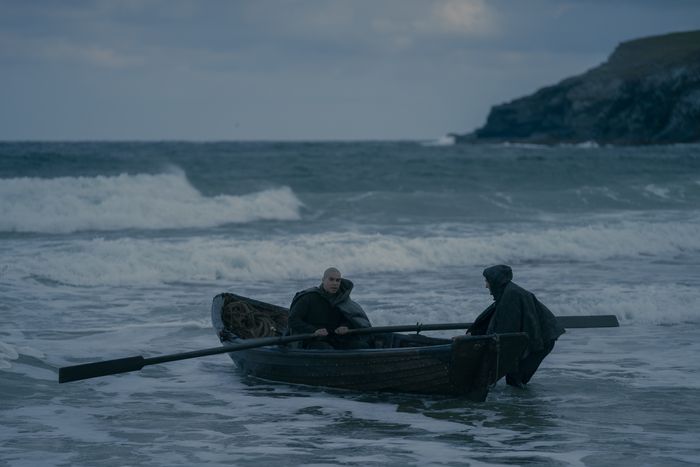
Something shocking happens at the end of the seventh episode of House of the Dragon, something that rarely, if ever, occurs in the Game of Thrones franchise: Somebody gets a happy ending.
At the end of “Driftmark,” it looks as though Daemon and Rhaenyra Targaryen have conspired to kill Rhaenyra’s husband, Laenor Velaryon, in order to pave the way for their own marriage. However, in the final moments, it’s revealed that Laenor faked his death by chucking the body of some poor sap into the fireplace, shaving his signature white locks, and rowing off to Pentos with his lover, Ser Qarl Correy. Maybe this won’t be the last of Laenor we’ll see in House of the Dragon. Or maybe it will be.
Laenor’s faked death is a big twist, and not just because pleasant surprises are so rare in Westeros. In The World of Ice & Fire and Fire & Blood, the two George R. R. Martin books that House of the Dragon is based on, Laenor does not survive — as far as anybody knows. Both books are in the style of in-fiction histories, supposedly written by maesters well after events like the Dance of Dragons took place. Unlike the A Song of Ice and Fire books that Game of Thrones adapted, which tell the story from the perspective of multiple point-of-view characters to create an objective telling of what happened, House of the Dragon’s source material is intentionally incomplete and subjective. On the page, the events of the Dance of Dragons are pieced together from different sources, including a fairly straitlaced (but biased) recounting from a Grand Maester and a lurid telling of the events according to a dwarf jester named Mushroom. Frequently, these two accounts have differing explanations of what happened, leading a reader of the book to wonder which version of events is the truth — or if the real story is something in between.
The show does not have this ambiguity, instead positioning itself as the objective truth about what happened. (Mushroom, sadly, is not in the show at all.) That means that while the books left some ambiguity to questions like whether or not Rhaenyra’s children were actually fathered by Ser Harwin Strong, the show makes it explicit and leaves no doubt.
All the sources in the books agree that Laenor died, however. He was seen quarreling with Ser Qarl, blades were drawn, and he was killed. The faux-history nature of the books does not preclude the possibility that Laenor survived, as we saw on the show; it just means that his survival was never part of the historical record. He did a really good job faking his death, and neither he nor Qarl were heard from again.
If that’s the case, don’t expect to see Laenor again in House of the Dragon. If he comes to the rescue a season or two down the line, it will be a radical departure from the source material, in which, remember, he is “dead” and, as such, doesn’t do anything else of note. It’s possible that Laenor could reappear in smaller ways, either as a future side plot in Pentos or as a character who covertly participates in the civil war to come without ever leaving a mark in the pages of history.
That feels unlikely, however. My prediction is that this is the end of Laenor’s tenure on House of the Dragon. Does that make this dangling, unresolved plot thread a missed opportunity — a twist whose potential is undermined by the historical record? Not necessarily. Laenor’s survival was an extremely effective twist; after all, the most surprising thing that can happen in the Game of Thrones franchise is something good. That’s how grim the series is, so it makes a certain amount of sense that a happy ending, rather than a brutal one, would make for an especially effective reveal (and it has the added bonus of surprising book-readers, too, while technically not changing canon).
There’s another thing. Without spoiling what will happen in House of the Dragon any more than Joffrey and Shireen did when they mentioned the events of the Dance of Dragons in a couple Game of Thrones episodes, this is not a story with a happy ending. Even by the standards of Game of Thrones, the Dance of Dragons is a brutal, terrible civil war, and there are no winners. There’s a real chance that Laenor’s surprising survival will be the last “nice” thing that happens in the show as the war heats up. Laenor and Qarl rowing off to a new life together also subverts the “bury your gays” trope, a frequently criticized tendency of stories giving their gay characters tragic endings. And, Laenor’s survival showed viewers something unexpected about Daemon and Rhaenyra, who we were all too ready to assume would stoop to assassination to get what they wanted. Instead, they did Laenor a kindness while still getting what they wanted. (Daemon did assassinate that other random guy so that they had a body to burn beyond recognition, so it’s not like he’s a total sweetheart, but you’ve got to grade Targaryens on a curve.)
If this is indeed the last we’ve seen of Laenor, it’s a fitting send-off not just to the character but to the idea that nice things can happen to good people. Do not expect House of the Dragon to be so unexpectedly kind again. Things are only going to get worse from here, but that’s no longer any of Laenor and Qarl’s business. Good for them.

